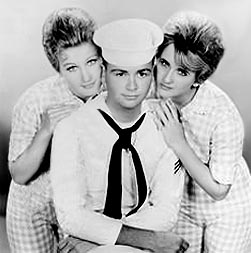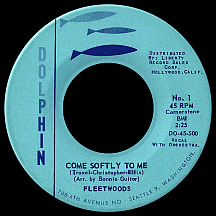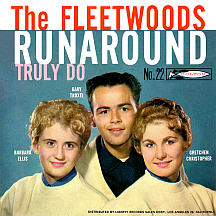THE FLEETWOODS
In 1959, the year of rock and roll's greatest expansion by way of the proliferation of top 40 radio formats being established throughout the nation, at least one major recording act went against the trend with an ultra-soft harmonic sound. Yet in spite of this rather mature, parent- and grandparent-approved approach, The Fleetwoods represented America's teenagers, fresh out of high school themselves and accepted by their own generation. Barbara Ellis, Gretchen Christopher and Gary Troxel did their part to preserve melody as an essential part of popular music, an important aspect that remained for many years before waning; in the final year of the 1950s their melodious, harmonious vocal sound placed this Olympia, Washington act at the forefront.
At first, Gretchen and Barbara figured on forming a female trio, but none of the girls they considered worked out. Then Gary came along, a high school band trumpeter who happened to sing with the soft kind of delivery they had in mind. "Come Softly" was a song Gretchen and Barbara had written that contained a sweeter equivalent to the assertive 'Dum, dum, dum, dum...' of The Dell-Vikings' great "Come Go With Me." A recording of their song on an inexpensive home tape machine was passed around, to the right people it turns out, and wound up in the hands of Bob Reisdorff, who had plans to start his own record company.
Shortly after the three friends graduated from Olympia High School in '58, they made a master of the song at Joe Boles' funky but now-legendary basement studio. Seattle-born country-pop singer Bonnie Guitar, who'd hit the top ten with "Dark Moon" the previous year, arranged the strictly a cappella session, the finished (or so they thought) result coming after dozens of takes. There was a bit of a rift between Gary and the girls, who didn't want to share credit for a song they'd written (though he had added a few lines), but Reisdorff convinced them to split the royalties three ways; he could have added his own name as cowriter, seeing as how he had them expand the title to "Come Softly To Me" (in the unlikely case anyone felt the original title was suggestive enough to deter potential airplay), but according to all three members of the group, Bob always treated his artists fairly.
Another change Reisdorff insisted on was that the trio ditch the then-dated name they wanted to use; Two Girls and a Guy was logically passed over in favor of The Fleetwoods, which came about somehwat randomly from a now-defunct local telephone prefix, Fleetwood. The tape of the song and its flip side, "I Care So Much," was sent to Los Angeles, where subtle instrumental backing (the bongos stand out most!) was added to the planned A side. In February 1959 it became the first single on Reisdorff's Dolphin Records, though another label with the name (a short-lived imprint of New York's Laurie Records), as well a possibility of confusion with Dolphin's of Hollywood, a record store affiliated with John Dolphin's Recorded in Hollywood label, made a change inevitable. Within weeks the new name, Dolton, was set, though the fish images on the label remained; Liberty Records took over distribution and for a time copies of the single were pressed on the green Liberty label.
In March, the record began its rapid climb up the charts. A cover by Seattle singer Ronnie Height (with unnamed female backing singers) appeared on Dore and had a nice run on the charts, though it never presented any real competition to the original; in early April the Fleetwoods' "Come Softly To Me" hit number one. Suddenly in high demand, there was just one downside for Barbara and Gretchen: despite the group's concept of being three equal voices, Gary Troxel became identified as the lead singer, much to the dismay of the girls, Gretchen in particular. Soft rock trios had become a trend (The Teddy Bears had topped the charts just four months earlier with "To Know Him, is To Love Him" and established country act The Browns were a few months away from blowing up with "The Three Bells") and the Fleetwoods were arguably the hottest of them all. "Graduation's Here," a Troxel-Christopher-Ellis song (their first on Dolton) predictably mirroring their own limited life experience, hit the top 40 in June.
The Blackwells (two guys and a girl, all siblings), a group from Northern California together more than a year, had gotten a recording deal with Jamie Records in the summer of '59, likely spurred by the success of the Fleetwoods as other companies hurriedly sought to sign acts that were similar to the hitmaking Olympia group. "Mr. Blue" was written by Dewayne Blackwell and became the Fleetwoods' second chart-topper after Dewayne auditioned the song for them; in November, it broke up Bobby Darin's nine week "Mack the Knife" run at number one for a single week. Perpetual movie song "Unchained Melody," a track on the trio's Mr. Blue album, was a minor hit for the Blackwells two years later when they recorded it Fleetwoods style.

Gretchen, Barbara and Gary had further success the next few years, though without the soft explosiveness of '59. "Outside My Wndow," penned by Hal David and Sherman Edwards, made the top 30 in March 1960. Brooklyn songwriter Cirino Colacrai's "Runaround," originally a top 20 hit for The Three Chuckles in 1954, hit the same level that summer. Like other pop stars before him, Gary committed to two years' Navy duty in the summer of '60. Media alarmists tried to stir something up (the two girls he left behind!), but in reality it was not much different than business as usual; stationed in San Diego, he was able to regularly record and perform with the group as before (with one difference: his Navy uniform became part of the act). In summer '61, Pittsburgh teen singer Marcy Joe attempted to commemorate his alleged absence with "When Gary Went Into the Navy," a throwaway (and non-hit) ditty inspired by the situation. Dewayne Blackwell's "The Last One to Know" made a brief chart appearance in the fall, then a remake of Sonny Knight's "Confidential" was a no-show. Before anyone could get too concerned, though, they bounced back into the top ten with "Tragedy," delivering the 1959 Thomas Wayne hit using a less-dire-sounding trademark Fleetwoods approach.
There were three more top 40 hits spread out over the next three years. "(He's) The Great Impostor," penned by Sharon Sheeley and soon-to-be singing star Jackie DeShannon, was one of the group's more enjoyable efforts in the fall of '61. "Lovers by Night, Strangers by Day," a livelier-than-usual number composed by Neval Nader and John Gluck (who also collabrated on hits for Bobby Vee, Bobby Vinton and Gene Pitney), made the grade in the fall of '62. Their final hit in the summer of 1963 had a twist to it: someone other than Gary (in this case Barbara) sang the lead vocal on a Fleetwoods hit, the Jesse Belvin oldie-but-goodie "Goodnight My Love."
The group recorded for Dolton until 1966; later singles include "Before and After (Losing You)," a late-'64 release that ended up being a big hit for Chad and Jeremy in mid-'65, and Gordon Lightfoot's "For Lovin' Me" in early '66 (it had already been a hit for Peter, Paul and Mary). This "folk" phase occurred as their Dolton contract ended, after which the three effectively split up. Gary appeared on Dot in 1968 and the original trio performed throughout the years in varying configurations of two or all three; Barbara Ellis retired and at some point Gary Troxel and Gretchen Christopher began heading different Fleetwoods acts, each obviously only one-third authentic. To Gretchen's chagrin, Gary's group would seem to be the preferred one, simply because he sang lead on nearly all of The Fleetwoods' memorable hits.
NOTABLE SINGLES:
- Come Softly To Me - 1959
- Graduation's Here - 1959
- Mr. Blue /
You Mean Everything to Me - 1959 - Outside My Window /
Magic Star - 1960 - Runaround - 1960
- The Last One to Know - 1960
- Confidential - 1960
- Tragedy - 1961
- (He's) The Great Impostor - 1961
- Lovers by Night, Strangers by Day - 1962
- You Should Have Been There - 1963
- Goodnight My Love - 1963
- Mr. Sandman - 1964
- Before and After (Losing You) - 1964
- For Lovin' Me - 1966
- Things I Didn't Say - 1968
by Gary Troxel



